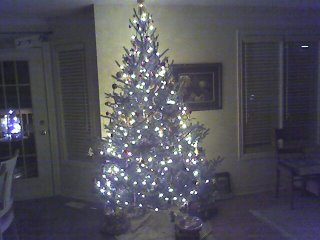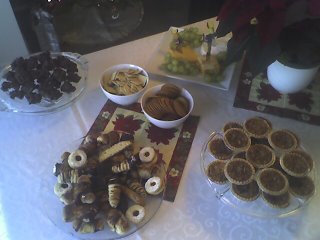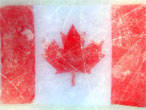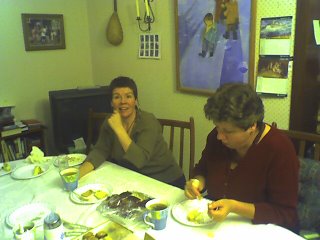I spoke briefly at a Remembrance Day service at our local hospital's (York Central) long term care facility. The stuff I used is in no way original (I included the author of the main part of it)) but I thought you might like to see it as a Remembrance Day reflection. The next post will be another thing I used as an illustration during the talk. For those of us over 40 thinking that the soldiers in most wars are young kids really, it makes me very thankful for the exuberance of youth and sad to know how many lost sons and brothers and husbands fighting for our freedoms. I's a bit long but worth the read.
Veterans Day Reflection
[most of it by Donald Sensing]
On November 11, 1918, the guns stopped firing along the western front in France ... World War I, the bloodiest war in history to that date, was thus ended by an agreement between the allies and Germany to cease fire. The allied powers soon memorialized the day the guns stopped. In America, November 11 was called Armistice Day. In 1954, President Eisenhower proclaimed the day would be called Veterans Day, intended to honor living veterans of military service.
In Canada, November 11 was (and still is) called Remembrance Day. Here and in other nations November 11 serves the same purposes, honoring both living veterans and those who died in service to their country. I preserve the distinction of the observances. Veterans Day honors living veterans, Memorial Day honors those who died in service. But we must not leave in limbo those who survived their service and died later, so we should remember them also.
Today is the 88th anniversary of the end of World War One, and we have just finished remembering the fith-year anniversary of the terrorist attacks on the Pentagon and World Trade Center. War came then to us in the first time in over a century. Some commentators have said that because of that fact, perhaps we need to reconsider what the definition of veteran is.
Peggy Noonan, a columnist for The Wall Street Journal, wrote:
On Friday, Sept. 14, I went with friends down to the staging area on the West Side Highway where all the trucks filled with guys coming off a 12-hour shift at ground zero would pass by. They were tough, rough men, the grunts of the city – construction workers and electrical workers and cops and emergency medical workers and firemen.
I joined a group that was just standing there as the truck convoys went by. And all we did was cheer. We all wanted to do some kind of volunteer work but there was nothing left to do, so we stood and cheered those who were doing. The trucks would go by and we’d cheer and wave and shout “God bless you!” and “We love you!” We waved flags and signs, clapped and threw kisses, and we meant it: We loved these men. And as the workers would go by – they would wave to us from their trucks and buses, and smile and nod – I realized that a lot of them were men who hadn’t been applauded since the day they danced to their song with their bride at their wedding.
And suddenly I looked around me at all of us who were cheering. And saw who we were. Investment bankers! Orthodontists! Magazine editors! In my group, a lawyer, a columnist and a writer. We had been the kings and queens of the city, respected professionals in a city that respects its professional class.
And this night we were nobody. We were so useless, all we could do was applaud the somebodies, the workers who, unlike us, had not been applauded much in their lives. And now they were saving our city.
I turned to my friend and said, “I have seen the grunts of New York become kings and queens of the City.” I was so moved and, oddly I guess, grateful. Because they’d always been the people who ran the place, who kept it going, they’d just never been given their due. But now – “And the last shall be first” – we were making up for it.
Science fiction writer Robert A. Heinlein wrote the best definition of veterans that I have ever read. He said that there is only one distinction between veterans and non-veterans. It isn’t intelligence or education or class. It is only the fact that veterans are those who have put their own mortal bodies between their loved ones’ homes and the war’s desolation. Veterans are those who love others enough to risk laying down their lives for them, especially people they do not even know. That’s all patriotism is, really: the willingness to risk yourself on behalf of people you do not actually know.
So the firemen and police and rescue workers of New York and Arlington, Va., are veterans of a new kind for a new kind of war.
This shared risk is crucial glue. There are no jobs in the service that are absolutely safe. Most living veterans as traditionally defined saw their service during wartime, but relatively few veterans were in actual danger during their service. More than five thousand sailors crew an aircraft carrier yet only a few dozen fliers from it face danger over enemy skies. Yet there is always the potential of dangerous service for all, even in peacetime.
In William Shakespeare’s play, Henry V, King Henry is informed of the great strength of an enemy army on the field, and the comparatively few numbers of Henry’s army. Henry is advised by Westmoreland that some of his men have deserted and others want to. Henry replies that anyone who “has no stomach” for the fight may depart with pay and a safe-conduct pass. “We would not die in that man’s company That fears his fellowship to die with us,” Henry says. Then Henry’s lines are some of the most stirring in all of the Immortal Bard’s plays:
This day is called the feast of Crispian:
He that outlives this day, and comes safe home,
Will stand a tip-toe when the day is named, . . .
He that shall live this day, and see old age,
Will yearly on the vigil feast his neighbours,
And say ‘To-morrow is Saint Crispian:’
Then will he strip his sleeve and show his scars.
And say ‘These wounds I had on Crispin’s day.’
Old men forget: yet all shall be forgot,
But he’ll remember with advantages
What feats he did that day: then shall our names ...
Be in their flowing cups freshly remembered.
This story shall the good man teach his son;
And Crispin Crispian shall ne’er go by,
From this day to the ending of the world,
But we in it shall be remembered;
We few, we happy few, we band of brothers;
For he to-day that sheds his blood with me
Shall be my brother; be he e’er so vile,
This day shall gentle his condition:
And gentlemen in England now a-bed
Shall think themselves accursed they were not here,
And hold their manhood cheap whilst any speak
That fought with us upon Saint Crispin’s day.
Let us remain united now, because we are now really all in this together, somehow. Perhaps it is the sense that we are living in shared danger, however remote the risk may actually be to most North Americans. And there are police and firefighters who were in New York and Northern Virginia who shall stand on tip-toe when Sept. 11 is named. They shall remember what feats they did that day. And the police and firemen who shed their blood together that day are brothers henceforth.
And so will the troops who toppled Saddam’s regime, and destroyed the Taliban rule and freed Afghanistan. So will those Canadians fighting in Afghanistan – even amidst the confusion and debate and wrangling back home about whether or not they should be there. They are there. They are dying so we don’t have to.
I received an email this week honouring Canadian troops in Afghanistan [see next post].
On this day I wish only to say to other veterans, part of my band of brothers and sisters, Thank you for our freedom. God keep you and be with you, “From this day to the ending of the world.”









